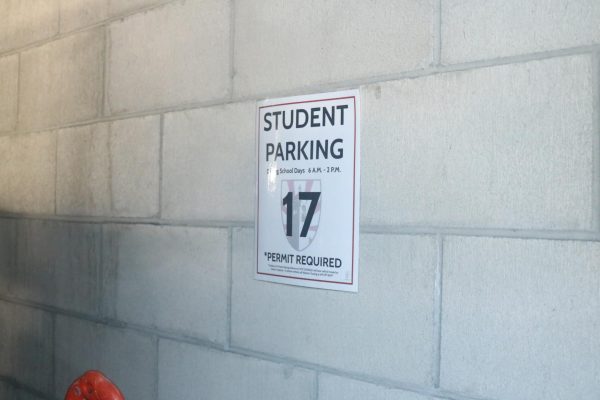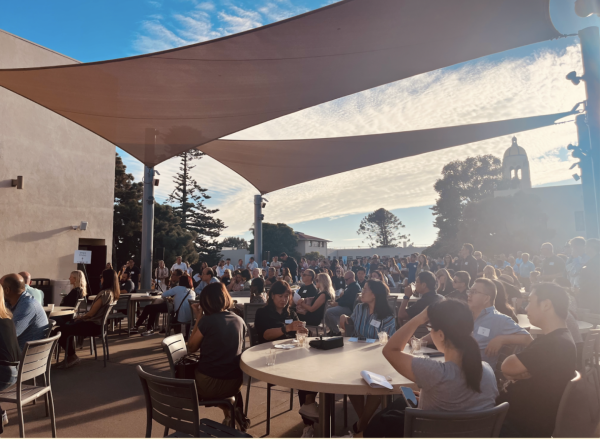Defined Lines
Faculty members were a great source of information for this article. All faculty members asked to be anonymous sources.
As allegations of sexual misconduct on our campus have come to light in the past three years, the Bishop’s administration has been discussing boundaries between students and teachers as well as navigating communication with the community about these matters.
Before this school year started, Bishop’s brought in a guest speaker, Judith Islas from the Liebert Cassidy Whitmore law firm, to give a talk to all Bishop’s employees about student boundaries and scenarios of mandated reporting. Her presentation introduced the strict practices employed by public schools and how they would be implemented into Bishop’s: if students need to talk with a teacher outside of class, they should bring another student with them; the door should not be closed during these conversations; and students and teachers cannot text or follow each other on social media.
The unspoken purpose of this meeting, just as much as it might’ve been to protect students, was to protect the school—to mitigate the possibility of lawsuits going forward. An anonymous teacher said, “[Islas’s] perspective was to ensure the school’s interests, which I think it’s safe to say, in many cases are aligned with the safety of our students and teachers. But the point going on was, she had such stringent recommendations that they didn’t correspond with some of our school values of truly caring for our students and helping them in the most efficient way possible.” The teacher added, “Everyone I spoke to that day and in my conversations in the following days had the feeling of disbelief and concern.” There was enough worry from teachers that these new measures would not serve in the best interest of students—especially in cases such as students having to talk to their teachers about tests or grades in the mandatory presence of another student—that the school held another meeting to scale back the extremity of these measures.
These events on campus were a manifestation of the modern question of boundaries that many schools across the country are facing. According to a Mondaq article by Dianna Bowen, a database of legal and financial information, “When the boundaries of [close student-faculty] relationships are not well-defined… the risks are the increased potential for claims by students or their parents.” The dispute isn’t about obvious ethical boundaries, like prohibiting sexual relations between teachers and students, but about navigating the intricacies—can doors be closed, or must they be open? As this summer’s meetings at Bishop’s proved, the task of reforming that line to lie between effective and invasive is challenging at best.
As a result of the summer meetings, a few posters for Lighthouse, a 24-hour workplace misconduct reporting service, appeared all over campus around September (including by water fountains and in the college counseling hall). Lighthouse appeared in the daily bulletin once, but no official conversations including students took place. The information was also added to the student handbook parents were informed through an email sent out on September 22. As their Confidentiality Commitment states, Lighthouse is independent of Bishop’s, and reports “may or may not be investigated at the sole discretion of the organization.” The service allows for fully anonymous reporting, and can be reached through www.lighthouse-services.com/bishops, their number (833) 940-0002, or their email reports@lighthouse-services.com.
Bishop’s Employee/Student Boundaries statement describes the specific protocols faculty must follow in their relationships with students and is available on the official Bishop’s website. The document has twelve specific protocols employees must follow, including: “avoid meeting [with students] in locations that are closed off or not visible or accessible to others” and “avoid creating excessive emotional attachments beyond the healthy employee/student relationship.” The document doesn’t explicitly define “professional” conduct, an adjective prevalent in the protocols. It instead gives specific examples for aspects of professionalism under a few of the bullet points, such as to “use sound judgment as to how much information [employees] share with students about their own personal life, not share information for their own personal emotional gratification, and [faculty] must avoid sharing any information about romantic, sexual, or other types of private or sensitive information.”
Bishop’s has taken other action as well in sending emails to the whole school community in September 2017, July 2018, and May 2019 about previous misconduct on campus after media coverage on the incidents. In that time, they’ve also sent an email to all living alumni giving them the opportunity to report any misconduct or abuse during their time at the school, again through Lighthouse Services. They sent an email to all parents on September 10 that included a list of all faculty/staff training sessions on “boundaries, professional roles, mandated reporting, sexual assault, healthy relationships and other relevant topics.”
In some cases involving teachers that were still employed by the school in recent years, Bishop’s chose to keep communication to students extremely limited. Gossip and speculation among the student body has been an unfortunate, inevitable result. The only source of information for most students has been through the grapevine. The information given to a small subset of students who were directly involved has spread to a much larger number of students on campus, but the typical open atmosphere is compromised with hushed conversations during lunch and between classes.
Bishop’s recognizes this consequence of communicating with only a small group of people, but the administration seems to be standing by their decision. Respecting the privacy of the involved parties as opposed to a potential fueling of gossip on campus seems to be an obvious concern. Above all, the school cannot be liable for the spreading of information; they informed the few people that they deemed justified to know and emphasized the importance of confidentiality, and those people could choose whether or not to listen.
In light of this reluctance to share information, conversations on campus about topics such as these have fizzled out in passing weeks. Whether these issues will remain hushed or will arise again at the prompting of a new scandal is a question that remains to be seen.

Carly Phoon joined The Tower her junior year and unexpectedly found her niche in graphics and layout. In her rare free time, she enjoys working at a vet...

Sariah Hossain is a senior and The Tower's Co-Editor-in-Chief. This is her fourth year on the publication and, as her friends can all attest, writing...











